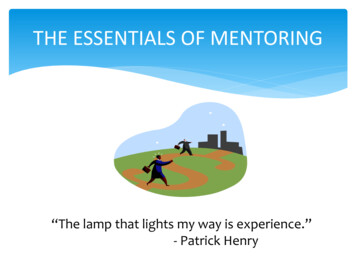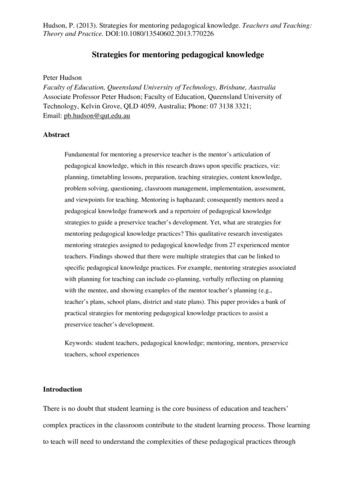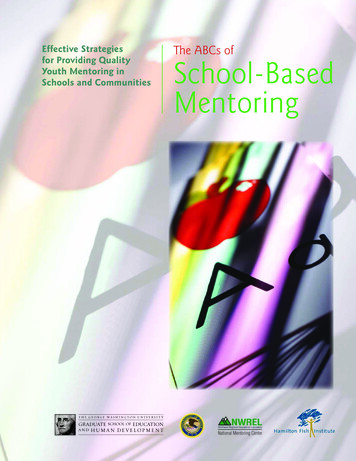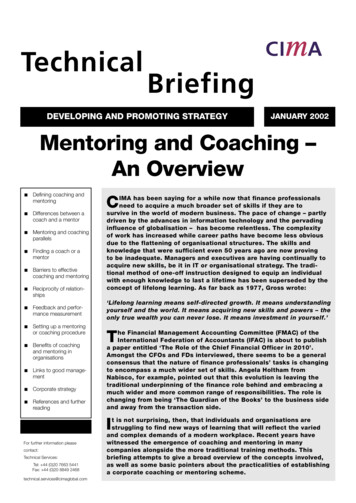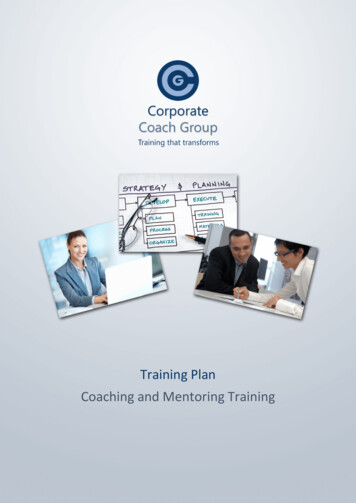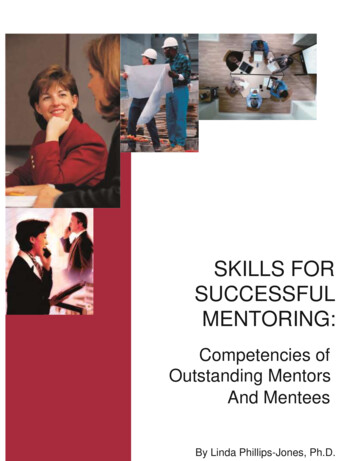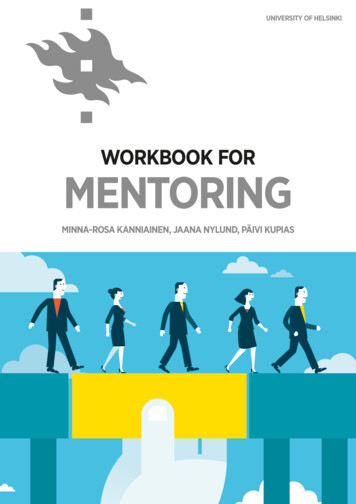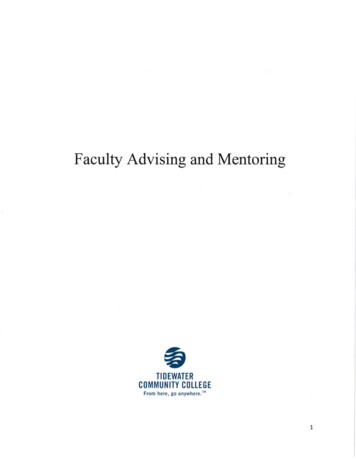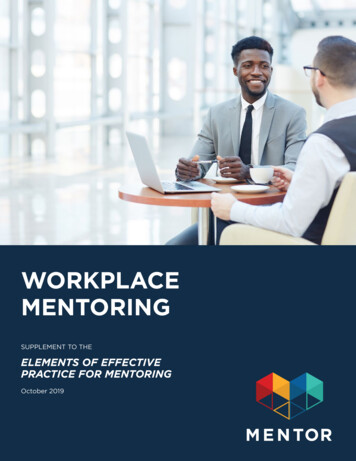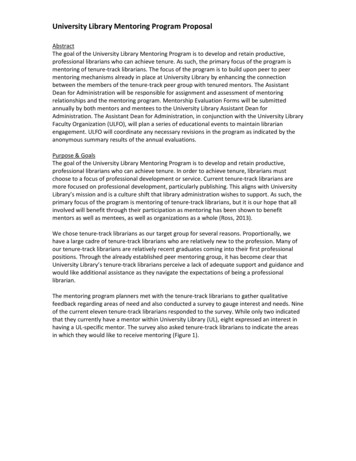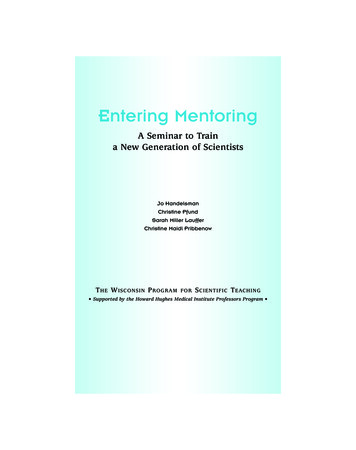
Transcription
18795 MentorTX14/22/054:39 PMPage iEntering MentoringA Seminar to Traina New Generation of ScientistsJo HandelsmanChristine PfundSarah Miller LaufferChristine Maidl PribbenowT HE W ISCONSIN P ROGRAMFORS CIENTIFIC T EACHING Supported by the Howard Hughes Medical Institute Professors Program
18795 MentorTX14/22/054:39 PMPage iiEntering MentoringJo HandelsmanChristine PfundSarah Miller LaufferChristine Maidl Pribbenow T HE W ISCONSIN P ROGRAMFORS CIENTIFIC T EACHING Supported by the Howard Hughes Medical Institute Professors Program Contact Information:Phone: (608) 265-0850Email: scientificteaching@mailplus.wisc.eduWebsite: http://scientificteaching.wisc.eduThe development of this book was supported by a grant from the Howard Hughes Medical Instituteto the University of Wisconsin-Madison in support of Professor Jo Handelsman.With contributions from:Janet Branchaw, Center for Biology EducationEvelyn Fine, Women in Science and Engineering Leadership InstituteHHMI Graduate Teaching Fellows and their faculty mentorsEdited by:Hilary HandelsmanFront Cover:The cover art is a fractal image, entitled, “Fractal Mitosis,” by Jay Jacobson, the creatorof the art form, FractalismTMCopyright 2005 by the Board of Regents of the University of Wisconsin SystemISBN 0-299-21570-9For PDF version of this book, go towww.hhmi.org/grants/pdf/labmanagement/entering mentoring.pdf
18795 MentorTX14/22/054:39 PMPage iiiPrefaceEffective mentoring can be learned, but not taught. Good mentors discover their own objectives, methods, and style by mentoring. And mentoring.And mentoring some more. Most faculty learn to mentor by experimenting andanalyzing success and failure, and many say that the process of developing aneffective method of mentoring takes years. No two students are the same ordevelop along the same trajectory, so mentoring must be continually customized, adjusted, and redirected to meet each student’s needs. A skilled mentor’s decisions and actions are guided by a reflective philosophy, a well-developed style, and an ability to assess student needs. There is certainly no book thatcan tell us how to deal with every student or situation, but a systematicapproach to analyzing and discussing mentoring may lead us to a method fortackling the knotty challenges inherent in the job.The goal of the seminar outlined in this manual is to accelerate theprocess of learning to be a mentor. The seminar provides mentors with an intellectual framework to guide them, an opportunity to experiment with variousmethods, and a forum in which to solve mentoring dilemmas with the help oftheir peers. Discussing mentoring issues during the seminar provides every mentor with experience—direct or indirect—working with diverse students, tacklinga range of mentoring challenges, and considering a myriad of possible solutions.Members of the seminar may hear about, and discuss, as many mentoring experiences as most of us handle in a decade, thereby benefiting from secondhandexperience to learn more quickly. We hope that, when mentors complete theseminar, they will have articulated their personal style and philosophy of mentoring and have a toolbox of strategies they can use when faced with difficultmentoring situations.The anticipated outcome of this seminar is twofold. First, we want toproduce confident, effective mentors. Second, we intend this seminar to have afar-reaching effect on the undergraduate research experience. Undergraduatesobtain numerous benefits from participating in independent research and thosebenefits can be amplified by good mentoring. Both outcomes enrich theresearch experience for everyone involved.
18795 MentorTX14/22/054:39 PMPage ivWe developed the mentoring seminar presented in this manual as partof The Wisconsin Program for Scientific Teaching, using an iterative approach ofdeveloping, testing, evaluating, and revising our teaching methods and seminarcontent. The material that survived is the result of seven different seminarcohorts led by four different facilitators. Therefore, the seminar presented herehas been tested in mixed formats by various facilitators. We have included topicsthat emerged repeatedly, questions that consistently generated discussion, andreadings that were universally appreciated by the mentors.Everyone who has taught this seminar has enjoyed it, and felt changedand enriched by it. Novices who have never run a lab or research group seem tobe as effective at running this seminar as seasoned faculty with decades of mentoring experience. We assume that this is because the discussions are propelledby the participants, not the facilitator, and all of us can draw on our experiencesas mentees, even if we don’t have experience as research mentors. As long as thefacilitator asks a few key questions, keeps the discussion focused, respectful, andinclusive, and helps the mentors see the patterns and principles raised in discussion, the seminar will be a success. We wish you fun and good mentoring as youembark on what we hope is a remarkable teaching and learning experience.Jo HandelsmanChristine PfundSarah Miller LaufferChristine Maidl Pribbenow
18795 MentorTX14/22/054:39 PMPage vContentsI.Mentoring Seminar Content, Format, & Implementation .viII.Big Questions in Mentoring .viiiIII.Syllabus .xIV.Mentoring Seminar: Session by SessionFacilitator Notes and Materials for Mentors .1Session 1—Getting Started .3Session 2—Learning to Communicate .17Session 3—Goals and Expectations .28Session 4—Identifying Challenges and Issues .49Session 5—Resolving Challenges and Issues .65Session 6—Evaluating Our Progress as Mentors .82Session 7—The Elements of Good Mentoring .85Session 8—Developing a Mentoring Philosophy .102V.Evaluation of the Mentoring Seminar .105VI.Resources .137VII.Appendix .138"No Dumb Questions" Seminar: Enriching the Research Experiencefor Undergraduates in Science
18795 MentorTX14/22/054:39 PMPage viMentoring Seminar Content, Format,& ImplementationContentThe content of each session is designed to address the key concernsand challenges identified by mentors we interviewed. The topics include: intellectual issues: comprehension and learning to askquestions technical issues: experimental design, precision, andaccuracy personal growth issues: developing confidence, creativity,and independence interpersonal issues: dealing with students of diverseexperiences and backgrounds, motivation, honestybetween mentor and student, scientific integrity, and discriminationFormatIn the discussion sessions we facilitated, we used a very open discussion format. Simply asking the mentors a few guiding questions led to vigorousdiscussion. The case studies and reading materials often provided a tangiblestarting point, but the mentors quickly moved from the hypothetical examples totheir own experiences with students. The seminar is most effective with mentorswho are working with students full-time, as, for example, in an undergraduateresearch summer program, because the short duration of the program intensifiesthe urgency of dealing successfully with challenges that arise. Likewise, the frequent contact with the students provides mentors the opportunity to implementimmediately ideas generated by the discussions.vi
18795 MentorTX14/22/054:39 PMPage viiImplementationPrior to the start of each session, copy the white pages for each mentorin your group. These pages contain the materials (readings, guiding questions,etc.) mentors will need for the following session. Alternatively, all the whitepages can be copied at the start of the seminar and distributed at the first meeting. Guiding questions and notes for group facilitators are pages printed on thelight blue pages, and are arranged in the manual session by session. It is important to have the first meeting with mentors before the mentees begin work inthe lab.vii
18795 MentorTX14/22/054:39 PMPage viiiBig Questions in MentoringBelow are some guiding questions that may be useful in discussionsabout mentoring.Expectations What do you see as your student’s greatest strength(s)? What area(s) do you think your student should focus ondeveloping? How do you suggest they do this, and howcan you facilitate this process? What do you expect your mentee to accomplish while inthe lab? How independent should your mentee be? How much assistance do you expect to provide for yourmentee? What do you hope to get out of the mentoring experience? What does your mentee hope to get out of the researchexperience? What have you learned about working with your studentthat you did not expect to learn?Scientific Teachingviii What is your approach to mentoring? How does the concept of "Scientific Teaching" apply tomentoring? Does your approach to mentoring involve active learningstrategies? What evidence do you have that your approach to mentoring is effective?
18795 MentorTX14/22/054:39 PMPage ix What evidence would convince you that your approach tomentoring is effective? How could you improve on your mentoring based on student feedback?Community of Resources What is the value of presenting mentoring challengesto your peers and hearing their approaches to a givenchallenge? Do you see your peers as a valuable resource inaddressing mentoring issues? Do you see your adviser or another faculty member inyour department as a resource on mentoring? Do you see your department as a network of mentors? How could you create a stronger community of mentorsand mentoring resources?Diversity How do you define diversity? Have you created an environment that allows your menteeto benefit from the diversity in your lab/department? How? How might another mentee with a different learning style,personal style, or background view your mentoringapproach? How do you deal with diverse learning styles, personalstyles, ethnicity, experience, gender, and nationality?ix
18795 MentorTX14/22/054:39 PMPage xSyllabus for Mentoring SeminarDatesTopicsSession 1Getting Started Session 2Session 3Goals and Expectations Session 4 Proposed solutions to the issuesraised in the case studiesCase studies: diversityMidcourse process checkEvaluating Our Progress asMentors Session 7Mentoring challenges and suggestionsThe Elements of GoodMentoring What can we learn from othermentors? What has proven effective in yourmentoring? PresentationsSession 81. A paragraph describing yourmentee’s project“What is a mentor?” inAdviser, Teacher, RoleModel, Friend; NAS2. Written mentoring philosophy1. A short biography of your menteewith information you gather frominterviewing them.2. Summary of the discussion youand your mentee had aboutexpectations“Mentoring: Learned, NotTaught”; J. HandelsmanA written proposal of a possible solution to one of the challengesdescribed during a previous mentoring discussion“Benefits and Challengesof Diversity”; WISELIThoughts about how you and yourmentee differ. How do these differences affect the summer experiencefor both of you?“Righting Writing”;J. HandelsmanCase studies from your first fewweeks—challenges and suggestionsHow do you know if there areproblems?Resolving Challenges & Issues Session 6Mentoring philosophiesCase study: trustHow do you know that theyunderstand what you are saying?“Scientific Teaching”;J. Handelsman et al.Identifying Challenges & Issues Session 5Case study: projectsMentees and their projectsEstablishing expectations—thementor’s and the mentee’sReadings“Teaching Scientists toTeach”; J. HandelsmanIntroductionsThe elements of a good researchprojectEstablishing a good relationshipwith your menteeLearning to Communicate Assignments DueDeveloping a MentoringPhilosophy Mentoring philosophies after thementoring experiencePresent one of your mentoring challenges to your PI (or another yourespect as a mentor) and ask howthey would handle the situation.Submit a summary of their responseand what you thought about it.Rewritten mentoring philosophy
18795 MentorTX24/22/054:48 PMPage 1Mentoring Seminar:Session by SessionFacilitator Notes and Materials for Mentors
18795 MentorTX24/22/054:48 PMPage 2
18795 MentorTX24/22/054:48 PMPage 3Session 1: Getting StartedSession 1Session 1:Getting Started3
18795 MentorTX24/22/054:48 PMPage 4ENTERING MENTORING: Training Scientist MentorsDiscussion Outline: Session 1Topics:IntroductionsDescribe the Mentoring SeminarDiscuss Seminar Logistics1. Syllabus2. Assignments3. ConfidentialityDiscussion Questions What are the elements of a good research project? How can you establish a good relationship with yourmentee?Describe Assignments for Session 2: Mentoring Philosophiesand Project Descriptions.Materials for Mentors:SyllabusGoals of the Mentoring SeminarConcepts, Techniques, and Practices to Teach Your New MenteePermission FormReading: “Scientific Teaching”Reading: “Teaching Scientists to Teach”4
18795 MentorTX24/22/054:48 PMPage 5Session 1: Getting StartedSession 1Session 1:IntroductionsThe Mentoring SeminarThis program is dedicated to improving the mentoring skills of a newgeneration of graduate students and postdoctoral researchers who may becomescience faculty. The seminar is designed to help them become effective mentorsto diverse students using discussions, collective experiences, and readings todevelop strategies for mentoring.SyllabusAn eight-session syllabus is included. It is recommended that you meetfor one hour each session with your group of mentors.AssignmentsTo foster positive attitudes toward the assignments, it may be helpful toexplain to your group of mentors that the assignments are meant to provide aframework for them to reflect on their roles as mentors and to encourage themto view their mentoring as an opportunity to engage in scientific teaching. Distributing student writing to the entire group can prompt interesting discussion.ConfidentialityYou will need to discuss confidentiality with your group. As a cohort,your group should agree on a policy for confidentiality regarding the ideasshared in each session. It is important that the group recognizes that regardlessof its confidentiality policy, it cannot control everything that is said outside theroom. If members have any concerns about sharing information, they should tailor their comments accordingly. In addition, members should decide if theywould like their names removed from any writing assignments before they arecompiled and distributed to the group. Last, The Wisconsin Program for Scientific Teaching asks each participant to consider signing a permission formregarding future use of their case studies. This form is included in this section.5
18795 MentorTX24/22/054:48 PMPage 6ENTERING MENTORING: Training Scientist MentorsWhat are the elements of a good research project?Mentors usually have a strong sense of what constitutes a good researchproject. Ask them, as a group, to come up with the elements of a good researchproject. Some thoughts that have emerged in previous discussions are: Projects should have a reasonable scopeProjects should be feasibleProjects should generate data that the student can presentProjects should not simply include cookbook experimentsProjects should have built-in difficulties that will be facedafter the student has developed some confidenceProjects should be multifacetedHow can you establish a good relationship withyour mentee?One way to start this discussion is to ask the mentors what they shoulddo the first time they meet with their mentee. Even if they have already met thestudent, this discussion can help the mentors consider the importance of thepersonal interaction they have with their mentee. Some thoughts from previousdiscussions are: 6Make direct eye contactBe enthusiasticIntroduce them to the lab and your lab matesAcquaint them with the buildingGet them started on a lab notebookTalk about the “big picture”Discuss lab policiesDiscuss the mentee’s backgroundGet to know your menteeMany mentors expressed concern that the undergraduate researcherswith whom they were working either did not know basic lab protocols and techniques or needed to be reminded of them. One mentoring group developed a listof techniques and skills every undergraduate researcher should know. A copy of
18795 MentorTX24/22/054:48 PMPage 7Session 1: Getting StartedSession 1that list is included in this section. This particular list was developed by mentorsworking in molecular biology labs; mentors working in other fields may wish tocreate a similar list more relevant to their lab’s area of inquiry.AssignmentsAsk mentors to write a paragraph describing their mentee’s project.Have each mentor describe their mentoring philosophy in writing.There is no length requirement. As the facilitator, you may wish todevelop your own philosophy and share it with the group.7
18795 MentorTX24/22/054:48 PMPage 8Syllabus for Mentoring SeminarDatesTopicsSession 1Getting Started Session 2Session 3Goals and Expectations Session 4Mentoring philosophiesCase study: trustHow do you know that theyunderstand what you are saying? Resolving Challenges & IssuesProposed solutions to the issuesraised in the case studies Case studies: diversity Midcourse process checkEvaluating Our Progress asMentors Session 7Mentoring challenges and suggestionsThe Elements of GoodMentoring Session 81. A paragraph describing yourmentee’s project“What is a mentor?” inAdviser, Teacher, RoleModel, Friend; NAS2. Written mentoring philosophy1. A short biography of your menteewith information you gather frominterviewing them.2. Summary of the discussion youand your mentee had aboutexpectations“Mentoring: Learned, NotTaught”; J. HandelsmanA written proposal of a possible solution to one of the challengesdescribed during a previous mentoring discussion“Benefits and Challengesof Diversity”; WISELIThoughts about how you and yourmentee differ. How do these differences affect the summer experiencefor both of you?“Righting Writing”;J. HandelsmanCase studies from your first fewweeks—challenges and suggestionsHow do you know if there areproblems? Session 6“Scientific Teaching”;J. Handelsman et al.Identifying Challenges & Issues Session 5Case study: projectsMentees and their projectsEstablishing expectations—thementor’s and the mentee’sReadings“Teaching Scientists toTeach”; J. HandelsmanIntroductionsThe elements of a good researchprojectEstablishing a good relationshipwith your menteeLearning to Communicate Assignments DueWhat can we learn from othermentors?What has proven effective in yourmentoring?PresentationsDeveloping a MentoringPhilosophy Mentoring philosophies after thementoring experiencePresent one of your mentoring challenges to your PI (or another yourespect as a mentor) and ask howthey would handle the situation.Submit a summary of their responseand what you thought about it.Rewritten mentoring philosophy
18795 MentorTX24/22/054:48 PMPage 9Session 1: Getting StartedSession 1Goals of the Mentoring SeminarThe goals of the Mentoring Seminar are to guide mentors to:understand “scientific teaching” and apply it in mentoringso they can: become more reflective and effective mentors, anddesign, implement, and evaluate various approaches tomentoringbuild a relationship based on trust and respect with amentee so they can: communicate more effectively with mentees stimulate creativity, independence, and confidence inmentees work well with students of diverse learning styles,personal styles, experiences, ethnicities, nationalities,and genderbuild a community with other mentors by: sharing mentoring challenges and solutions witheach other9
18795 MentorTX24/22/054:48 PMPage 10ENTERING MENTORING: Training Scientist MentorsConcepts, Techniques, and Practicesto Review with Your New Mentee*1. Remind them that it is better to ask questions than to make a mistake that could have easily been avoided.2. General lab safety procedures including:a, Appropriate clothingb. Food and drink in the labc. Lab coat/gloves/glasses3. How to find and use helpful reference manuals such asCurrent Protocols4. Chemical and biological safety issues including:a. How to dispose of wastesb. How and when to use a fume hoodc. How to handle chemicals safelyd. How to clean up a spille. How to assess whether a particular chemical should behandled in a fume hoodf. How to handle and dispose of biological materials5. “Chemical hygiene”—cleaning up, discarding excess (not returning waste to the original bottle!), using clean spatulas each time6. How to use a pipette correctly, including how to read and manipulate it7. Making chemical solutions; provide guide sheets for:a. Solution preparationb. Molarity calculationsc. Dilutions8. Understanding the importance and practice of sterile technique9. Media preparation and how to use an autoclave10
18795 MentorTX24/22/054:48 PMPage 11Session 1: Getting StartedSession 110. Literature research skills11. Basic microbiology including:a.Plating for single coloniesb.Growing liquid culturesc.Growth conditions for an organism12. Basic molecular biology techniques including:a. DNA isolationb. Proper use of restriction enzymes13. DNA isolation:a. How to avoid contaminating DNA/RNA free/autoclaved materialsb. How to open microfuge tubes properlyc. How to label reagents14. Basic guidelines for generating graphs and tables*This list was compiled by mentors working primarily in molecularbiology and microbiology labs. If your mentee’s research does not use molecularbiology techniques, you may wish to generate a list that is more relevant toyour field.11
18795 MentorTX24/22/054:48 PMPage 12ENTERING MENTORING: Training Scientist MentorsDear Mentor:During the course of your discussions and writing assignments as mentors, TheWisconsin Program for Scientific Teaching has been compiling a series of mentoring case studies. The program would like to use these case studies for futurementoring discussion groups, and to supplement a book it has prepared on mentoring. In all instances, the author of each case study and any person(s) mentioned in it would remain anonymous. If your case study is chosen to beincluded, the program would ask for your approval of the text prior to distribution if you so desire.Please sign the form below and return it to your discussion facilitator if you arewilling to grant The Wisconsin Program for Scientific Teaching permission to useany of your case studies either verbally or in writing.I grant The Wisconsin Program for Scientific Teaching permission to use my casestudies in future discussion groups and to supplement a book on mentoring,whether Web-based or in print. I understand that I will remain anonymous, aswill any individuals mentioned in this work.Would you like to be contacted for approval of any text based on your case studyprior to distribution?NOYESEMAILSignature DatePrint
18795 MentorTX24/22/054:48 PMPage 13POLICY FORUME D U C AT I O NScientific TeachingJo Handelsman,1* Diane Ebert-May,2 Robert Beichner,3 Peter Bruns,4Amy Chang,5 Robert DeHaan,6,† Jim Gentile,7 Sarah Lauffer,1James Stewart,8 Shirley M. Tilghman,9 William B. Wood10ince publication of the AAAS 1989 report “Science for all Americans” (1),commissions, panels, and workinggroups have agreed that reform in scienceeducation should be founded on “scientificteaching,” in which teaching is approachedwith the same rigor as science at its best (2).Scientific teaching involves active learningstrategies to engage students in the processof science and teaching methods that havebeen systematically tested and shown toreach diverse students (3).Given the widespread agreement, it mayseem surprising that change has not progressed rapidly nor been driven by the research universities as a collective force.Instead, reform has been initiated by a few pioneers, while many other scientists have actively resisted changing their teaching. Sowhy do outstanding scientists who demandrigorous proof for scientific assertions intheir research continue to use and, indeed, defend on the basis of the intuition alone, teaching methods that are not the most effective?Many scientists are still unaware of the dataand analyses that demonstrate the effectiveness of active learning techniques. Othersmay distrust the data because they see scientists who have flourished in the current educational system. Still others feel intimidatedby the challenge of learning new teachingmethods or may fear that identification asteachers will reduce their credibility as researchers (3).This Policy Forum is needed becausemost scientists don’t read reports but theydo read Science. In addition, reports generally do not offer a guide to learning how toS1Howard Hughes Medical Institute Professor, Departmentof Plant Pathology, University of Wisconsin–Madison;of Plant Biology, Michigan StateUniversity; 3Department of Physics, North CarolinaState University; 4Howard Hughes Medical Institute;5American Society for Microbiology; 6National ResearchCouncil; 7Dean of Natural Sciences, Hope College;8Department of Curriculum and Instruction, Universityof Wisconsin–Madison; 9President, Princeton University; 10Department of Molecular Cellular, andDevelopmental Biology, University of Colorado atBoulder. For complete addresses, see SOM.2Department*To whom correspondence should be addressed.E-mail: joh@plantpath.wisc.edu.†Present address: Division of Educational Studies,Emory University, Atlanta, GA, 30322, USA.do scientific teaching, as we do with supporting online material (SOM) (3) and table(see page 522). We also present recommendations for moving the revolution forward.Implementing Change in LecturesActive participation in lectures and discoverybased laboratories helps students develop thehabits of mind that drive science. However,most introductory courses rely on “transmission-of-information” lecturesand “cookbook” laboratory exercises—techniques that are nothighly effective in fostering conceptual understanding or scientific reasoning. There is mounting evidence that supplementingor replacing lectures with activelearning strategies and engagingstudents in discovery and scientific process improves learning and knowledge retention (3).Introductory classes often have high enrollments, frequently approaching 1000students in biology courses. This need notbe an impediment to scientific teaching.Many exercises that depart from traditionalmethods are now readily accessible on theWeb, which makes it unnecessary for teachers to develop and test their own (3).Quantitative assessment indicates that theseinteractive approaches to lecturing significantly enhance learning, and although timeallocated to inquiry-based activities reduces coverage of specific content, it doesnot reduce knowledge acquisition as measured by standardized exams (4).Faculty are also using computer systems to engage students, assess learning,and shape teaching. Students can be askedto read and solve problems on a Web site,and their answers can be analyzed beforeclass to guide the design of lectures (3).Some scientists have replaced lectures almost entirely. Laws’s course “Calculus-BasedPhysics Without Lectures” at DickinsonUniversity (5) and Beichner’s program,SCALE-UP, at North Carolina State University (see figure, this page) rely on a problem-based format in which students work collaboratively to make observations and to analyze experimental results. Students wholearned physics in the SCALE-UP format at awww.sciencemag.orgReprinted with permission from SCIENCE 304: 521-522 2004 AAASSCIENCEVOL 304wide range of institutions demonstrated betterproblem-solving ability, conceptual understanding, and success in subsequent coursescompared with students who had learned intraditional, passive formats (3).These results are neither isolated nordiscipline-specific. At the University ofOregon, Udovic showed dramatic differences between students taught biology in atraditional lecture and those taught “Workshop Biology,” a series of active, inquirybased learning modules (6). Similarly impressive results were achieved by Wright ina comparison of active and passive learningstrategies in chemistry (7). Others havetaught cross-disciplinary problem-basedcourses that integrate across scientific disciplines, such as Trempy’s, “The WorldAccording to Microbes,” atOregon State University,which integrates science,math, and engineering. Thecourse serves science ma-A physics classroom at North Carolina StateUniversity arranged for traditional lectures (inset) and redesigned for group problem-solvingin the SCALE-UP program.jors and nonmajors, and outcome assessments indicate high content retention andstudent satisfaction (8).Students as ScientistsScientists of all disciplines have developedinquiry-based labs that require students todevelop hypotheses, design and conduct experiments, collect and interpret data, andwrite about their results (9). Many of theseinvolve simple, inexpensive materials configured so that they invite students to asktheir own questions. In addition to labs thathave already been tested in the classroom,resources are available to help teachers convert cookbook labs into open-ended, inquiry-based labs (3). Some schools provideintroductory-level students with the opportunity to conduct original research in a professor’s research lab rather than take a tradition-23 APRIL 2004521
18795 MentorTX24/22/054:48 PMPage 14POLICY FORUMal classroom lab course (3). These opportunities are challenging for instructors, butteach students the essence of investigation.How Universities Can Promote ChangeResearch universities should provide leadership in the reform movement. Faculty andadministrators should collaborate to overcome the barriers and to create an educational ethos that enables change. We need toinform scientists about education researchand the instructional resources available tothem so that they can make informed choices. We must admit that citing our most successful students as evidence that our teaching methods are effec
Effective mentoring can be learned, but not taught. Good mentors dis-cover their own objectives, methods, and style by mentoring. And mentoring. And mentoring some more. Most faculty learn to mentor by experimenting and analyzing success and failure, and many say that the process of developing an effective method of mentoring takes years.

